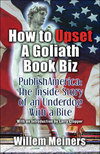I received an email press release today from Ben Costello, who has written a non-fiction book about GUNSMOKE, one of my favorite shows. Naturally, I was intrigued. I was even more intrigued when I saw the book came from Five Star, one of my favorite publishing companies (which is bringing out my book THE MAN WITH THE IRON-ON BADGE).
I checked out the book on Amazon and discovered it was selling for the outrageous sum of $75. Surely, Five Star wouldn’t price the book so high… and then I noticed something. His book was published by "Five Star Publications." I’m published by "Five Star Publishers." (aka "Five Star Press," though not to be confused with Five Star Press, Five Star Publications’ publicity arm)
So I checked out Five Star Publications and discovered it’s a vanity press (to further complicate things, there’s also a Five Star Publishing, a completely different company, which does magazines for the Agricultural and Construction industries). Five Star Publications offers every publishing service you can imagine…for a price.
While I was at it, I visited Ben’s website, and discovered he’s represented by Janette Anderson, an agent with Five Star Celebrity, which appears to be a division of — you guessed it — Five Star Publications, which published Ben’s book.
[Portions Deleted 7-27-05]
UPDATE 7-27-05: I’ve been contacted by Five Star Publications, who would like me to make it clear that Ben Costello’s book was not self-published. Although Five Star Publications does offer self-publishing services, they state that his book was published under a traditional publishing contract (you can see the complete text of their letter in the comments section of this post). I apologize to Ben Costello for the error. By the way, before I heard from Five Star Publications, I ordered the GUNSMOKE book. I couldn’t resist. I’m a GUNSMOKE geek.
I’ve also been contacted by Janette Anderson’s representatives, who wish to make it clear that none of her clients have paid to be published. I apologize for the error and have deleted the inaccurate portions of the post.
They also state that she doesn’t work for Five Star and that there is no affiliation between "Five Star Celebrity" and "Five Star Publications." I replied to Ms. Anderson’s representatives that the press release on her site
seems to say the opposite — and that she shares the
same logo and website as Five Star Publications. Any reasonable person
would conclude there is an affiliation. But I said that if I am
mistaken, I will be glad to immediately correct any errors or
misinterpretations I have made.
UPDATE 7-29-05 – Janette Anderson responds with a letter, presented unedited and in its entirety, to the issues raised in this post.

